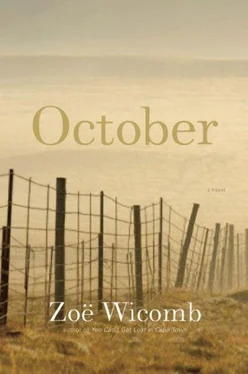This house is strange.
Its shadows lie.
Say, tell me, why does its lock fit my key?
— Toni Morrison, Home
Home. What kinder place could there be on earth, and
why did it seem to them all like exile? Oh to be passing
anonymously through an impersonal landscape! Oh, not
to know every stump and stone, not to remember how the
fields of Queen Anne’s lace figured in the childish happiness
they had offered to their father’s hopes, God bless him.
— Marilynne Robinson, Home
And I saw in the turning so clearly a child’s
Forgotten mornings when he walked with his mother
Through the parables
Of sun light
And the legends of the green chapels
And the twice told fields of infancy
That his tears burned my cheeks and his heart moved in mine.
— Dylan Thomas, “Poem in October”
I gratefully acknowledge the generous fellowship at the University of Macau, which enabled me to finish this novel.
Many thanks to Sophia Klaase, whose photographs have been an inspiration; to Frances Cairncross as well as Alice and Johnny Green for kindly allowing me to escape to their cottages in Galloway; and to Professor Derek Attridge for his support. I am also indebted to Henrietta Dax, Annari van der Merwe and Lynne Brown for their help in Cape Town.
Special thanks are due to The New Press, to Diane Wachtell for her support since the beginning and to Jed Bickman and Sarah Fan for preparing this novel.
And for everything, thanks, as always, to Roger Palmer.
Mercia Murray is a woman of fifty-two years who has been left.
There is the ready-made condition of having been left and that, as we know, as she knows, involves a death of sorts. But that is a less-than-helpful metaphor. For all the emptiness, there is her broken heart and an unthinkable amount of tears. As a thinking woman, Mercia goes over every gesture, every word that was uttered at the time, in search perhaps of ambiguity, but reflection reveals no hidden meanings. She has been left, and that is the banal truth. Thus, moving from the passive voice, from the self as subject, her thoughts stumble over the question: whom has she been left by? Well, she can hardly say that Craig has left her, since the man who spoke and acted was not the Craig she knew. Thus another ready-made: Mercia has been left by a stranger. Which should mean that there is something unreal about her grief, but that does not stop the tears from flowing, the heart from bursting.
Mercia has a best friend, her younger colleague Smithy, who says that time will bring an end to the suffering. When Mercia, slumped on the sofa, stops crying for a second to send a scornful look, Smithy warns that ready-mades cannot be sniffed at, and that there is the danger of becoming addicted to grief. Many a left one will not let go of the condition, will cosset a heart that lurches about to the broken rhythms of sobbing.
Smithy claps her hands and says, Let’s get organized. What do you have to do this week? Let’s clear lectures and supervisions for the next three days so you can get some healing sleep. Which makes Mercia sit up. Good old considerate Craig, she says wryly, not a stranger after all. See how he chose a Friday afternoon to tell me. All packed up and gone within a day, leaving me with a long weekend for grieving. By tomorrow I will have cried my heart out, so no need to miss a single class, she sobs.
There’s my girl, Smithy says, and pulls out of her bag the peaty, medicinal Bruichladdich that they discovered on a trip to Islay. This will put hair on your chest.
Jacques Theophilus Murray is a bad egg.
Unlike an egg his badness is not contained, concealed within a sound, flawless shell. He is a drunk, and wears his drunkenness on his sleeve, which is to say that there are bags under his eyes, that his face is a flushed mass of veins barely concealed by his dark brown coloring, and that Meester, a pillar of respectability in the village of Kliprand, has suffered the humiliation of his son spending his days in the new, unfortunately named Aspoester bar that has opened in the village. Jake wears his trousers low down on his hips, showing the crack of his buttocks. Which may be the fashion nowadays amongst well-to-do young men, but he is neither young nor well-to-do; there may well be a whiff of urine; and, in fact, the trousers reference the skollie gear of his youth.
When Jake wakes on the morning of the first of September with an evil taste in his mouth, his first thought is of oblivion. What would he give to sink into the softness of a feather pillow, down into deep forgetful sleep, but there is no pillow under his throbbing head. His mouth is parched; he stretches out his hand for the jug of water — Sylvie always puts a jug of water by his bedside — but there is no jug. Light drilling through the curtains, blood-red curtains for fuck’s sake, pierces his eyes, so that he turns onto his stomach. Already the heat is oppressive. He must snatch more sleep, but then a groan escapes as he remembers what has to be done on that day. Already it is late; he can tell from the light; and there can be no more than say nine hours of daylight left.
On that first day of the month he must kill Grootbaas, Meester, his father. In the kitchen, Sylvie has a fine butcher’s knife, which she keeps razor sharp. He need look no further. He will plunge the knife, twist it into the bastard’s heart.
Sylvie is in the kitchen feeding the baby. She knows nothing of Jake’s thoughts, but the baby, Willem Nicholas Murray, known as Nicky, who has woken up late after a night interrupted by his father’s shenanigans, must sense the patricide, for hearing Jake groan in the adjacent room, he spits out the nipple and purses his full rosy lips with distaste for the nasty world of adults.
Nicky is nearly five years old and given his rude health and firm tread is by no means a baby. Some busybodies would say that he is well beyond breast-feeding. Sylvie has thought of weaning, but what harm could a suckle at the beginning and end of the day do? Besides, the boy would make such a fuss. But what now? Has the little one decided for himself?
What’s up with you? she asks. But Nicky stares at his mother and refuses to speak.
Sylvie has much experience with sheep. She has since childhood reared lambs, has cradled hanslammertjies in her arms, hand-fed them milk from a bottle and teat, knowledge which she expects to transfer readily to child rearing, but this one has flummoxed her since birth with his contrary human ways. She tries the left breast. The child turns away with unmistakable disgust, so that she puts him down on the old sofa and buttons up her blouse. He does not protest; instead, he stares at her with wide-open woeful eyes. Nicholas, she says, trying out the controversial name. The child, normally a chatterbox, does not answer.
She has insisted; it was only right that Nicky should have his grandfather’s name. Jake had no business registering the first name as Willem, a common Afrikaans name at which she still smarts. Why not at least William? Jake was of course drunk, but for all her scolding he just nodded knowingly, and spat, Call him Klaas if you like. And count yourself lucky I didn’t call him Theophobe. Which sounds quite respectable to Sylvie. She has a feeling that Jake does not care for the boy. She knows that to be a sin.
Sylvie is unnerved by the child’s silence, by his unflinching stare. Standing like the countrywoman that she is, her left arm is tucked back, the left hand stretched across her back to clutch at the right elbow. The right hand rests on her chest. In this manner, an expert on the television said, countrywomen announce at the same time their humility and their steely determination to see things through. Sylvie listened with interest; she is not averse to explanations that show her to be part of a wider world, only what a pity that the program was in English, which she does not follow with ease.
Читать дальше












